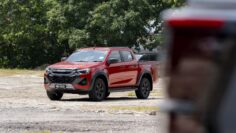For over a decade now, there has been a general shift towards SUVs, and whilst there are certain merits to it, there is also some additional baggage (pun intended) to be borne. Whilst there are arguably some merits to owning a SUV, I think owners should know all the nuts and bolts before rushing out to change into a SUV. Personally, I am one of the few who still prefer driving a sedan.
Here are some of the reasons why:-
- You cannot get something for nothing – Heavyweights eat more!
SUV’s are generally larger, so they do offer somewhat larger space – however, it comes at a price. I cite some new SUV owners who purchased a newly-introduces SUV offered at a very affordable price, and after only a month start complaining about fuel consumption.
You can’t really blame them – after driving a 1.1 or 1.2 ton sedan for most of their lives, they rush for a very affordable SUV that weighs a lot more, and then after a couple of months of euphoria, it sinks in that their fuel bills actually are considerably higher than what they were used to.
And so what did they expect? Simply put, it just takes more energy to move a heavier mass, so an SUV will consume more fuel than a much lighter sedan.
Whilst the additional space in a SUV is appreciated, we typically drive alone or with one or two passengers most of the time. I have heard of people buying a 7-seater SUV / MPV because once a year, they take their parents out for dinner. Just as it takes more flour to make a doughnut with a larger hole, it means you need a larger and heavier body, basically more metal to go around the space you make in the SUV. Thus it takes more fuel to move this mass around.

- Higher Maintenance Cost Versus Sedan
Other than increased fuel costs, parts on SUV’s are also usually larger and heavier, therefore they generally cost more to replace. For instance, it takes more rubber, nylon and steel to make a SUV tyre than a sedan tyre. Similarly, larger SUV’s run larger engines, so even the engine oil required per service is sometime one and a half times more, or double compared to a sedan. Even washing your SUV at one of those ‘Cyclone’ washing joints costs more. It costs me RM5.00 for a quick wash of my sedan but RM7.00 for my equally small SUV.
When it Is time to replace your shock absorbers, it will also cost more as they are usually bigger than those found in sedans, and therefore will cost more simply because they need more material to make these parts.
- Road Handling- Sedan Versus SUV
A sedan has a much lower centre of gravity, and will always handle better than a SUV, which sits higher. As a car reviewer, whenever I say a SUV handles well, it is always relative to other SUVs – and there is no way a SUV can out-handle or out-drive another sedan of similar size and capacity – it’s a simple matter of physics. – the lower vehicle will go around corners better; besides, un-sprung weight is generally also higher on SUVs, which also contributes to the relative instability.

- SUV’s have Higher Wear & Tear Versus Sedans
SUV’s are generally heavier, thus the tyre, wheels and suspension undergo more stress. Your tyres will not last as long as those on a sedan, your brakes need to be bigger, and they will cost more to replace, and perhaps they may not last as long, as it needs more effort to stop a heavier vehicle, and your suspension will go soft on you sooner than in a sedan car. Again it leads to higher maintenance costs.
- Ride Comfort of a Sedan is Better Than SUV
The ride comfort of a sedan is usually much better than that of a SUV; there are certain exceptions – if the sedan is purpose-built for competition or for performance, it may end up just as harsh or worse than a SUV, and I can tell you of a few live examples I have experienced, but generally the sedans are way more comfortable, and you will feel it over a long journey.
This is because SUV tyres are made to withstand heavier punishment, and therefore have stiffer sidewalls and heavier reinforcement within their carcasses. These make them less inclined to ‘flex’ thus making them more uncomfortable.
In addition, the suspension system in a SUV is usually made to withstand harsher road conditions, and therefore they would need stiffer springs and higher absorber settings.
- Sedans are easier to drive
The above is a fact – being lighter, a sedan in easily maneuvered, and the steering feel is usually lighter. You would be less fatigued after a long day of driving a sedan than you would if you were driving a SUV.
Ladies who drive, and even some men too, would know the difference when trying to park a SUV versus a sedan.
Give all the above pointers, I do have a liking for certain SUVs, but my favourite will always be a sedan.






![[ID: 0j6BBkdsdMU] Youtube Automatic](https://media.yskhongdriving.com/2024/10/10141729/id-0j6bbkdsdmu-youtube-automatic-236x133.jpg)

![[ID: A3XUmdaLCJA] Youtube Automatic](https://media.yskhongdriving.com/2024/02/24164356/id-a3xumdalcja-youtube-automatic-236x133.jpg)
![[ID: lk-wGD6X_aE] Youtube Automatic](https://media.yskhongdriving.com/2024/01/22191810/id-lk-wgd6xae-youtube-automatic-236x133.jpg)
![[ID: 2MPvC1zsjYk] Youtube Automatic](https://media.yskhongdriving.com/2024/01/11000157/id-2mpvc1zsjyk-youtube-automatic-236x133.jpg)
